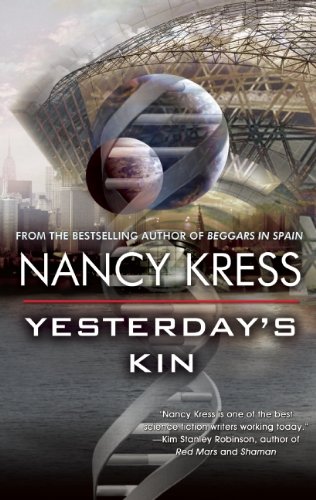
![]() Yesterday’s Kin by Nancy Kress
Yesterday’s Kin by Nancy Kress
Yesterday’s Kin, by Hugo and Nebula award winning author Nancy Kress, is a first-contact story set in a not so distant dystopian future. We follow Marianne Jenner, a geneticist who is celebrating a recent career breakthrough — the discovery that all human beings are descended from a common female ancestor — when she is unexpectedly called to a meeting set up by the secretive aliens that have landed recently in New York Harbor. Not understanding why, of all people, the aliens have asked her to be part of the first visiting committee to speak with the aliens, she quickly discovers that there is a surprising link between the aliens and her recent discovery.
That link, however, is secondary to why the aliens have chosen to allow, for the very first time, people to visit their base. There is an incoming interstellar spore cloud that will infect and kill every human being on Earth, and they want to join forces with Earth’s best scientists to find a cure for it. Before I go into my problems with Yesterday’s Kin, I want to point out the wishy-washy reason that is given for why the aliens have decided to collaborate with Earth’s scientists instead of doing everything by themselves: While they might be incredibly advanced in some areas, such as physics, they are on par with humans when it comes to biology. It’s just too unlikely for a civilization that has mastered interstellar travel to not be equally advanced in biology and, as such, it makes for a very weak explanation.
The main problem with Yesterday’s Kin however is that the nature of the spore cloud doesn’t allow for much suspense to be built around it. The scientists quickly discover that the spore is incredibly complex and that creating a cure will be nearly impossible in the timeframe they have. This destroys any room that there might have been for the characters to have a meaningful impact on the plot, and it doesn’t make for a very compelling reason to keep reading.
There are hints in the beginning chapters that the book will explore the merits or misgivings of protectionism as a foreign policy, with two of Marianne’s children representing differing views on the topic, but that exploration never happens and in the end I was left wondering whether Nancy Kress was trying, in the beginning, to do something different with Yesterday’s Kin than what she ended up with.
Along with Marianne’s, there a secondary storyline featuring Noah, the youngest of Marianne’s children, who is addicted to a drug capable of changing a person’s personality for a while. This storyline is somewhat interesting — for me to explain it I would have to spoil a central plot twist of Yesterday’s Kin — but it is unconnected to the main plot arc and could have been cut out without losing anything in terms of plot development.
It is hard to imagine how the climax could have been satisfyingly handled, and the one in Yesterday’s Kin ends up resembling, in essence, the one in H.G. Wells’ The War of the Worlds. It feels bland and anticlimactic, but by the way the plot was set up, it could not have been otherwise.
Yesterday’s Kin feels like a book that was trying to do much more than it did. The initial hints of a political theme suggests this, but the book isn’t able to untangle itself from its problems and is ultimately unsuccessful in what it does.



Wow, it looks like she really fell down here.
I usually like Kress’s ideas better than I like her execution in longer works. I think long short story/novella is her strength, and it does sound like she took on more than she could bring home in this one. This was on my list to read, so I appreciate the heads-up.I probably will still read it, but maybe I won’t be in a rush to do that.
Well said. I found it interesting and thoughtful, but fundamentally flawed. It was an overwhelmingly pessimistic book, with no sense of alien wonder or awe, and not a single character I cared for. It ultimately fell flat for me in so many ways.
Bob, generally I don’t connect well with her characters.